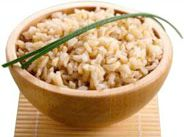“Diet has been strongly implicated in rheumatoid arthritis for many years, in terms of both cause and cure” writes Dr Michael Murray, naturopathic doctor. He goes on to state that many studies have shown that “rheumatoid arthritis is not found in societies that eat a more primitive diet and is found at a relatively high rates in societies consuming the so-called Western diet”. Eating a healthy diet appears to offer some protection against developing rheumatoid arthritis and diet therapy shows tremendous promise in the treatment of rheumatoid arthritis.
At one of my recent local book signings for The Antianxiety Food Solution, a gentleman in the audience asked me about arthritis and I promised him I’d share an article about it. I actually spent year in South Africa working with many folks with rheumatoid arthritis and they found some amazing benefits with some of what follows in this natural approach to arthritis. There are also a surprising number of studies on food/nutrients and RA. It’s also much more common in women!
So, continuing with the article…There is evidence that rheumatoid arthritis is less severe in the southern Mediterranean countries, such as Italy and Greece, where oil-rich fish, fruit, vegetables and olive oil are consumed in greater amounts than in many other countries. The Mediterranean-type diet can be considered a primitive diet since it is rich in whole foods and also low in sugar, refined carbohydrates and other processed Western-type foods. A number of studies have shown that people with rheumatoid arthritis, who changed to a Mediterranean-type diet, experienced reduced inflammation, increased physical function and improved vitality. And a better mood!
Two important components of the Mediterranean way of eating seem to be very helpful for reducing the inflammation associated with rheumatoid arthritis: olive oil and oily fish. An additional bonus of consuming olive oil is that it promotes the healing of the digestive system. There is often damage as a result of taking anti-inflammatory drugs for long periods. And fish oil has been shown to reduce the risk of heart disease, which is common with rheumatoid arthritis.
Another dietary consideration is addressing food intolerances – there are a number of foods that can be considered triggers of symptoms and one of these is gluten. So, some people with rheumatoid arthritis may also benefit from excluding wheat, oats, rye and barley from their diets. You can read more about gluten here.
Many of the same dietary recommendations for rheumatoid arthritis apply to inflammation associated with osteoarthritis too. As well as making dietary changes, there is growing scientific evidence to support the use of dietary supplements in the treatment of both rheumatoid arthritis and osteoarthritis. There are many supplements and some work better for some people – just a few are ginger, curcumin and MSM. An added benefit is that they have no side-effects.



 I’m sharing this wonderfully funny and romantic blog called The Musings of a Romantic Comedy Girl because I’m a big fan of laughter and if you’ve been following my blog posts you’ll know that I’m a BIG romantic at heart (see this post about Charlene marrying her prince
I’m sharing this wonderfully funny and romantic blog called The Musings of a Romantic Comedy Girl because I’m a big fan of laughter and if you’ve been following my blog posts you’ll know that I’m a BIG romantic at heart (see this post about Charlene marrying her prince 







